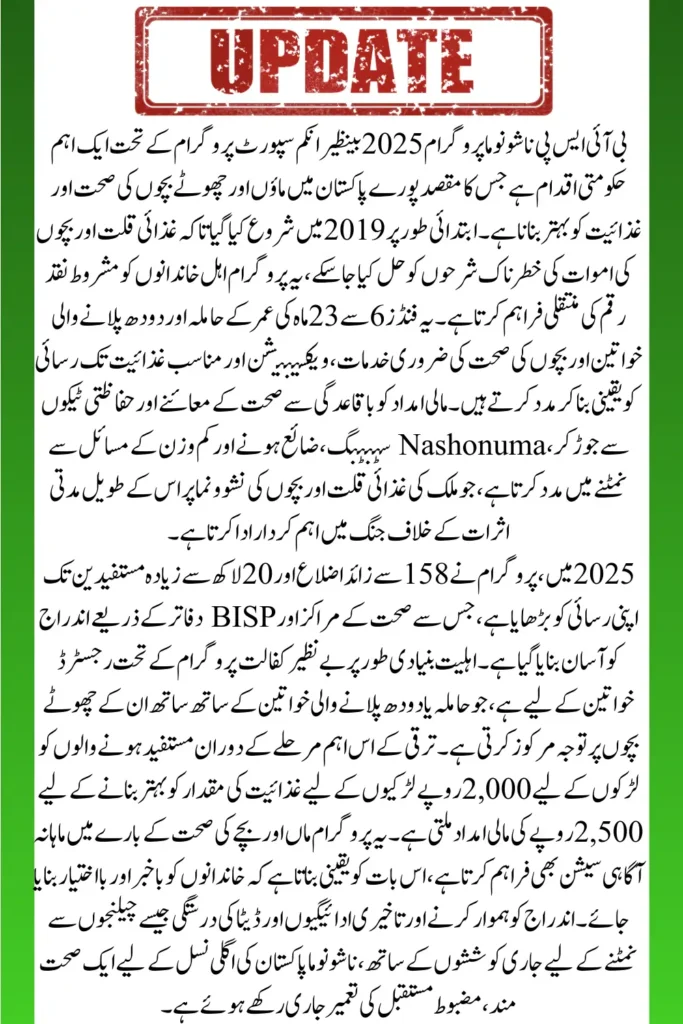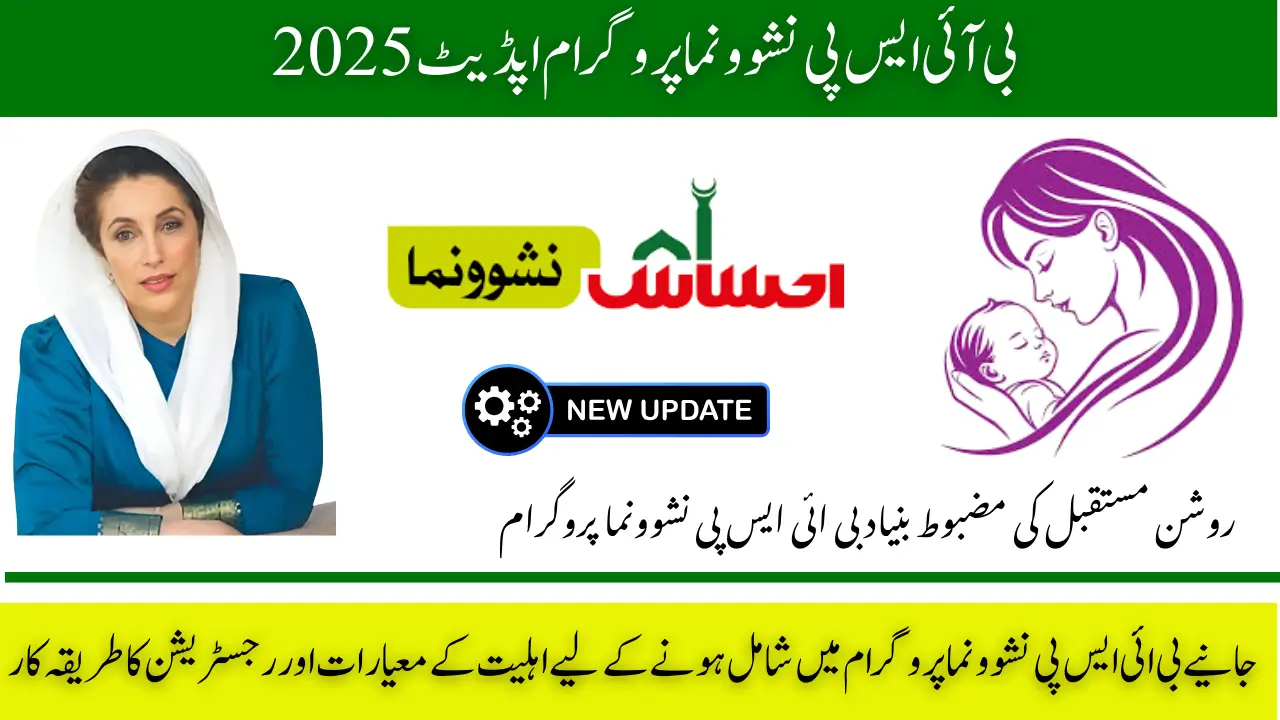BISP Nashonuma Program Update
The BISP Nashonuma Program is a vital initiative under the Benazir Income Support Program aimed at improving maternal and child health across Pakistan. Launched to address malnutrition and health challenges among women and young children, the program provides conditional cash transfers to eligible families. These funds help mothers access essential healthcare services, vaccinations, and proper nutrition for their children, promoting healthier growth and development. Nashonuma plays a crucial role in empowering vulnerable families by linking financial support with health and nutrition goals, thereby contributing to Pakistan’s broader social welfare and public health objectives.
Avoid Ehsaas Program 8171 Scams and Check Payments Securely. Stay Safe All Details
In 2025, the BISP Nashonuma Program continues to expand its reach, ensuring wider coverage and streamlined enrollment processes. The program focuses on pregnant women and children under the age of two, offering financial assistance conditioned on regular health check-ups and vaccinations.
This innovative approach encourages behavioral change and awareness among beneficiaries while providing economic relief. With transparent eligibility criteria and easy registration methods, Nashonuma has become a cornerstone in Pakistan’s fight against malnutrition and infant mortality, supporting millions of families to build healthier futures.
Why and When the Nashonuma Program Was Launched
The BISP Nashonuma Program was initiated in 2019 as a strategic response to Pakistan’s growing concerns over maternal and child malnutrition, which posed serious threats to public health and future generations. Recognizing the urgent need to improve nutrition and healthcare access for vulnerable mothers and children, the government introduced this conditional cash transfer scheme under the umbrella of the Benazir Income Support Program.
The program was designed to incentivize regular health check-ups, vaccinations, and nutritional support, aiming to reduce infant mortality rates and promote healthier childhood development. By linking financial aid to health milestones, Nashonuma seeks to break the cycle of poverty and malnutrition, ensuring sustainable improvements in the well-being of Pakistan’s most at-risk populations.
Zewar-e-Taleem Program Punjab’s Initiative for Educational Support Full Guide 2025
Objective of the BISP Nashonuma Program
The Nashonuma Program started in just 14 districts but quickly expanded to cover about 158 districts across Pakistan. It now reaches over two million people through more than 500 development centers and mobile health sites.
The main goal is to protect newborns and the future of Pakistan from diseases and ensure better growth by improving maternal nutrition. Currently, 40.2% of children face stunting, 28.9% are underweight, and 17.7% suffer from wasting, putting their health at serious risk.
This program aims to reduce these issues by providing mothers with essential dietary support. Originally launched as Healthy Mother, Healthy Child by Prime Minister Imran Khan, it now operates under the name Nashonuma, focusing on healthier mothers and stronger children nationwide.
CM Punjab 1100 E-Taxi Scheme 2025: Eligibility and Subsidy Check Now

BISP Nashonuma Program Eligibility
The BISP Nashonuma Program targets vulnerable families to improve maternal and child health across Pakistan. It primarily supports women already enrolled in the Benazir Kafalat Program, especially those who are pregnant or breastfeeding. The initiative focuses on children aged 6 to 23 months, a critical period for growth and nutrition, to protect them from diseases and malnutrition by providing essential nutritional support and healthcare. This program aims to strengthen the health and development of mothers and young children, ensuring a brighter future for Pakistan’s next generation.
Complete Guide to BISP Taleemi Wazaif Benefits Criteria and Application Process
Eligibility Criteria for BISP Nashonuma Program
- Registered beneficiaries of the Benazir Kafalat Program.
- Pregnant women.
- Lactating mothers.
- Children aged 6 to 23 months.
- Families experiencing financial difficulties.
- Children are showing signs of malnutrition or stunted growth due to economic constraints.
- Priority given to mothers and children requiring nutritional and healthcare support.
This program is designed to assist families struggling with economic hardship whose children show signs of poor growth and malnutrition. By providing access to nutritional supplements and health services, the Nashonuma Program helps combat malnutrition and supports healthier child development. Its goal is to build a healthier, safer, and more dignified future for children across Pakistan, addressing critical health needs during the earliest stages of life.
Documents Required
To register for the BISP Nashonuma Program, eligible applicants must provide specific documents. First, visit the nearest health center for eligibility verification.
- Pregnant Women: Submit pregnancy test results along with the medical report and EPI card.
- Breastfeeding Mothers: Provide the child’s birth certificate and EPI card as proof of vaccination.
- Children Aged 6 to 23 Months: Present the child’s B-Form and EPI card.
These documents ensure smooth registration and access to program benefits.The BISP Nashonuma Program 2025 is now accepting applications check your eligibility and enroll to receive vital support for your family’s nutrition and health. Don’t miss out on this updated initiative aimed at improving well-being through targeted assistance.
8171 Ehsaas Program 2025 CNIC Check Online Portal and SMS Method Explained
How to Enroll in the Nashonuma Program
Enrolling in the Nashonuma Program is a simple process designed to help eligible families access vital health and nutrition benefits. First, visit your nearest designated health center or BISP office for initial registration.
Make sure to carry all required documents, such as pregnancy test results, birth certificates, B-Forms, and EPI cards, depending on your eligibility category.
Next, a health official will verify your documents and assess the health status of the mother and child. Once verified, your details will be entered into the official Nashonuma database.
After successful registration, beneficiaries will start receiving program benefits, including nutritional support and health monitoring services.
For additional assistance, you can also contact local BISP helplines or visit the official BISP website for guidance on enrollment procedures. This enrollment process ensures that eligible mothers and children receive timely support for better health and development.
Assistance Amount in the Nashonuma Program
The Nashonuma Program provides immediate financial support to eligible beneficiaries upon registration.
- For male children, the amount is Rs. 2,000, while for female children, it is Rs. 2,500.
- Mothers with twins or triplets can receive double or triple the assistance accordingly, offering additional support for families with multiple young children.
Assistance is given for three months, targeting newborns and children aged between six and 23 months.
National Bank Introduces Pakistan’s First Pink Debit Card for Women. Full Details Inside
Key Benefits of the Benazir Nashonuma Program
The Benazir Nashonuma Program offers several important benefits aimed at improving child growth and maternal health. Financially, it provides Rs. 2,000 for boys and Rs. 2,500 for girls to help cover nutritional needs during pregnancy and early childhood.
Health services are also a vital part of the program, including regular medical check-ups, access to medicines, and nutritional supplements for children. Additionally, the program conducts monthly awareness sessions to educate mothers about proper nutrition, health care, and child development, ensuring healthier futures for Pakistan’s next generation.
Focus on Maternal and Child Health
The Nashonuma Program prioritizes the health and well-being of both mothers and their children. It specifically supports pregnant and lactating women by providing financial aid to ensure they get the essential nutrition needed during this critical period. For children aged six to 23 months, the program emphasizes proper growth and development by offering regular health check-ups, vaccinations, and nutritional supplements. This comprehensive approach helps reduce malnutrition and promotes healthier early childhood development, aiming to build a stronger, healthier future generation across Pakistan.
Common Issues in the BISP Nashonuma Program
- Delayed Payments: Some beneficiaries experience delays in receiving financial assistance due to administrative processing or verification issues.
- Registration Problems: Errors in document submission or incomplete information can cause rejection or delays in enrollment.
- Limited Awareness: Many eligible families are unaware of the program or its benefits, leading to low participation in certain areas.
- Access to Health Centers: In remote regions, beneficiaries face challenges reaching designated health centers for check-ups and registration.
- Data Inaccuracy: Incorrect or outdated beneficiary data can affect eligibility verification and benefit distribution.
- Technical Glitches: Occasional technical problems in the BISP database or mobile verification systems can disrupt the enrollment process.
Sindh Govt Launches 10,000 Free E-Bikes for Women Registration Starts Check Now
Conclusion
The BISP Nashonuma Program 2025 remains a cornerstone initiative to improve maternal and child health across Pakistan. By linking financial support to essential health services and nutrition, it effectively combats malnutrition and promotes healthier growth in children. With expanded coverage and simplified enrollment, Nashonuma continues to empower vulnerable families, ensuring a safer and brighter future for Pakistan’s next generation. This program exemplifies the government’s commitment to social welfare and sustainable public health progress.
FAQs
Who is eligible for the Nashonuma Program?
Eligible beneficiaries include pregnant and lactating women registered with the Benazir Kafalat Program and children aged 6 to 23 months from financially vulnerable families.
What documents are required to register?
Pregnant women need pregnancy test results and EPI cards, breastfeeding mothers must provide birth certificates and EPI cards, and children aged 6-23 months require B-Forms and EPI cards.
How much financial assistance does the program offer?
The program provides Rs. 2,000 for boys and Rs. 2,500 for girls, with additional support for twins or triplets.
How can I enroll in the Nashonuma Program?
Visit the nearest health center or BISP office with the required documents. Health officials will verify your eligibility and register you in the program.
What are the main benefits of the program?
Besides financial aid, beneficiaries receive regular health check-ups, nutritional supplements, vaccinations, and monthly awareness sessions on maternal and child health.
CM Punjab Electric Bus Program: 100 More Buses To Arrive, Know All Important Information
